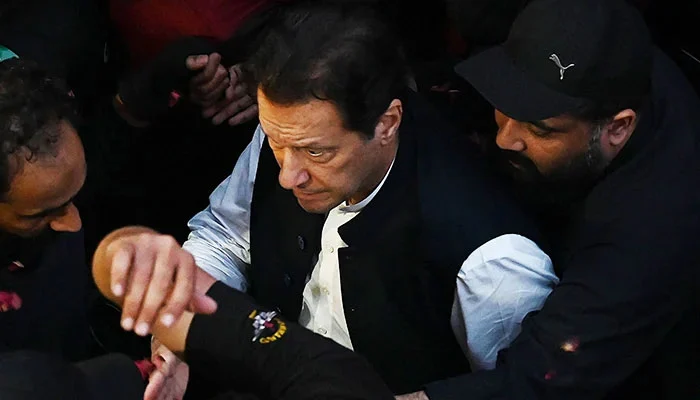- Hearing took place at location where Khan is under custody.
- ECP had sought criminal proceedings against former PM.
- Imran Khan’s indictment in the case was pending for long.
An Islamabad district and sessions court on Wednesday framed charges against former prime minister Imran Khan in the Toshakhana case — in which the deposed premier is accused of taking gifts in an illegal manner.
Additional Sessions Judge Humayun Dilawar indicted the incarcerated chairman of the Pakistan Tehreek-e-Insaf (PTI) in the case for “deliberately concealing” details of the gifts he retained from the Toshaskhana — a repository where presents handed to government officials from foreign officials are kept — during his tenure as the prime minister.
Khan, however, denied the charges and claimed innocence.
The Election Commission of Pakistan (ECP) had sought proceedings under the criminal law against the former prime minister in the case.
The indictment in the case was pending for a long period of time as the PTI chief had been avoiding appearing before the court.
Last week, the Islamabad court summoned Khan for May 10 to frame charges against him in the case. In its reference, the electoral watchdog alleges that the former premier had “deliberately concealed” details of the gifts he retained from the Toshaskhana.
It should be noted that Khan was not brought to a regular court in the federal capital and his scheduled hearing took place at the location where he was under custody.
The Islamabad chief commissioner earlier said that Khan, instead of being taken to F-8 Court Complex and Judicial Complex G 11/4, will be presented at New Police Guest House, Police Lines — which has been given the one-time status of the court for this particular hearing, a notification issued by the Government of Pakistan read.
Last year in October, the ECP, in a consensus verdict in Toshakana reference, disqualified the former premier and ruled that he was no more a member of the National Assembly.
Criminal proceedings will be initiated against the PTI chairman for misdeclaration, read the verdict.
On October 22, Khan — who was deposed as the prime minister in April last year via a vote of no confidence — challenged the order of the ECP in the Islamabad High Court, praying to the court to set aside the judgment as ECP had no jurisdiction over the matter.
What is the Toshakhana case?
Under the rules governing “Toshakhana” — a Persian word meaning “treasure house” — government officials can keep gifts if they have a low worth, while they must pay a dramatically reduced fee to the government for extravagant items.
The Toshakhana is under a microscope ever since the emergence of the allegations that Imran Khan purchased the gifts he received as prime minister at throwaway rates and sold them off in the open market for staggering profits.
The 70-year-old cricketer-turned-politician was accused of misusing his 2018 to 2022 premiership to buy and sell gifts in state possession that were received during visits abroad and worth more than Rs140 million ($635,000).
The gifts included watches given by a royal family, according to government officials, who have alleged previously that Khan’s aides sold them in Dubai.
The gifts included seven wristwatches, six made by watchmaker Rolex, and the most expensive a “Master Graff limited edition” valued at 85 million Pakistani rupees ($385,000).
The election commission’s order had said Imran stood disqualified under Article 63(1)(p) of the Constitution.
Following the order, the election watchdog moved the Islamabad sessions court and sought criminal proceedings against him — and the PTI chief has missed several hearings.


 Entertainment21 hours ago
Entertainment21 hours ago
 Latest News20 hours ago
Latest News20 hours ago
 Latest News20 hours ago
Latest News20 hours ago
 Latest News20 hours ago
Latest News20 hours ago
 Latest News20 hours ago
Latest News20 hours ago
 Latest News20 hours ago
Latest News20 hours ago
 Latest News20 hours ago
Latest News20 hours ago
 Entertainment21 hours ago
Entertainment21 hours ago





















